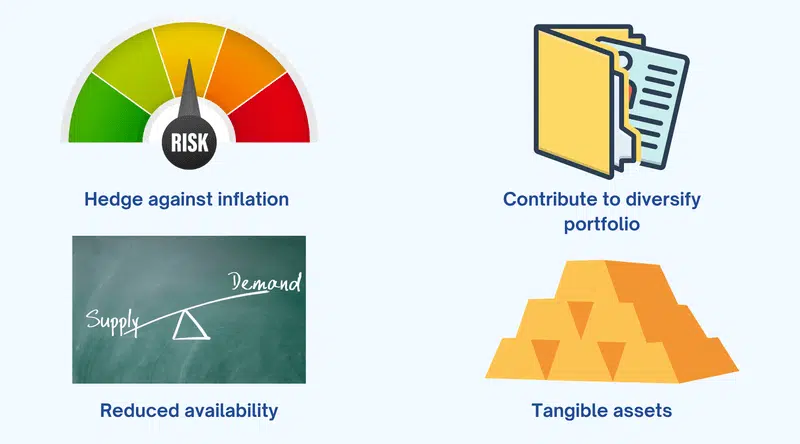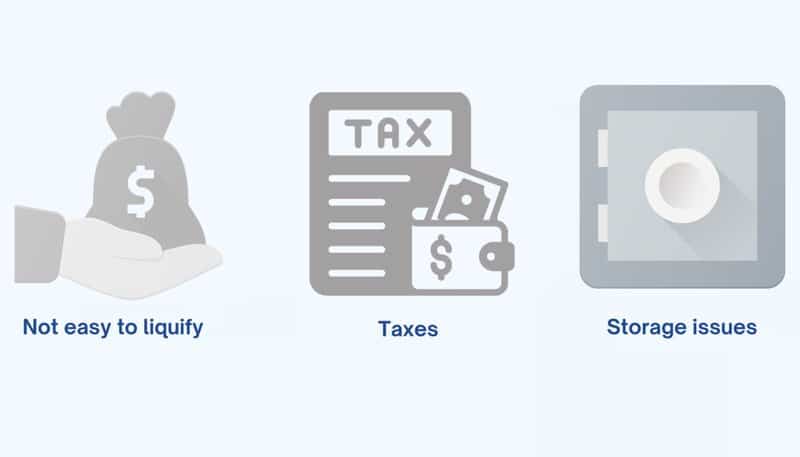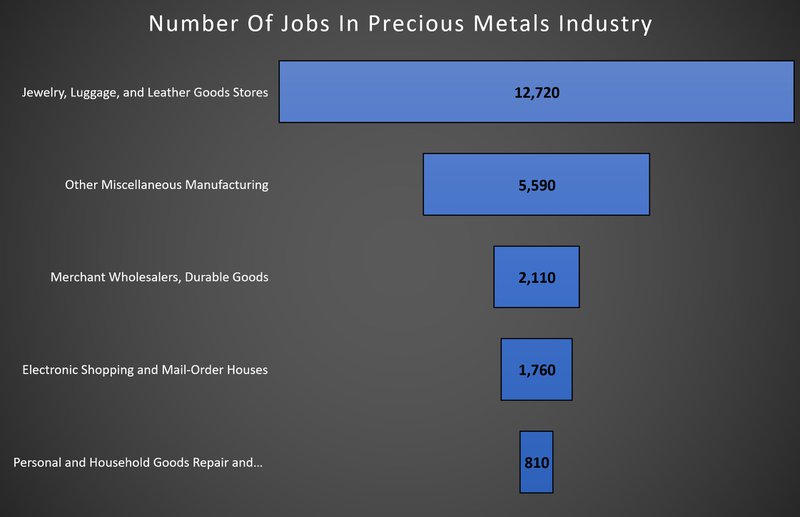Are you confused about choosing a career path? Well, you have come to the right place. At Totempool, we regularly cover mainstream and unconventional career paths for the benefit of our readers. This article will look at a career path many people do not discuss. We will explain in detail the answer to the question – Is precious metals a good career path?
Yes, a career in precious metals is good. It is definitely recommended if you are looking for something other than a typical 9-5 job. Or if you are looking for a field that values people with a creative bent of mind.
Table of contents:
- Is Precious Metals a Good Career Path?
- What Are Precious Metals?
- Essential Traits Needed to Become a Precious Metals Worker
- Pros and Cons of Investing in Precious Metals
- Is Precious Metals a Good Career Path: Learn About The Job Opportunities
Is Precious Metals a Good Career Path?
There comes a time in everyone's life when they must decide on their career path. It is a daunting decision, as it entails that our choices today will shape our future. One of the most debated topics for potential investors and aspiring professionals is whether precious metals are a good career choice.
The answer is straightforward. Yes, a career in precious metals is good. Exploring a career in the precious metals industry can offer a wide range of opportunities for business professionals and entry-level employees. This includes investment advisory, currency trading, digital coin mining, bullion sales, distribution, refining, and metal smelting services.
The world of precious metals is vast; it stretches from trading to mining, refining to fabrication, and everything in between. With each sector differentiating itself with unique expertise requirements and skillsets, it can be confusing for those wanting to enter this industry without prior experience or knowledge base.
Despite this sector's vast array of opportunities, job seekers may face challenges such as competition, economic instability, or environmental pressures. Additionally, it can be difficult to find employment at smaller firms without previous experience or relevant certifications/licenses.
Regardless of these challenges, however, those pursuing a career in precious metals will likely benefit from an expanding market demand for sustainable resources and alternative currencies. The need for skilled workers with advanced technical knowledge has become increasingly important within the industry, making investing time into education extremely valuable while navigating various career paths.
What Are Precious Metals?
Gold, silver, platinum, palladium, osmium, rhodium, iridium, rhenium, and ruthenium are some metals that fall under the category of precious metals. Several reasons are behind the astronomical demand for these precious metals. This is because they are helpful as an investment. This is especially true for silver and gold.
Why do people hoard precious metals such as gold and silver?
We shall look at some reasons why people like to buy gold and silver here:
- Financial Concerns: In times of political instability or financial crisis, gold and silver are considered safe stores of value.
- Inflation: Other investment forms, such as stocks, bonds, and cryptocurrencies, can fluctuate wildly or depreciate in value. However, gold and silver are assets that always maintain their value. Even if there is a price drop, it is usually for a short period of time. Also, the demand for precious metals is generally inelastic in the long run.
- Wars: During times of war, savings in the form of gold and silver can be exchanged for food and shelter.
Essential Traits Needed to Become a Precious Metals Worker
Someone who wishes to work with precious metals must have specific characteristics. Firstly, he should possess great powers of concentration. This will enable him to work long hours without getting distracted.
Moreover, his vision must be sharp. Also, he should possess excellent hand-eye coordination and patience. Plus, he must also be great with tools.
He must also know how to distinguish between real jewelry, gemstones, and some worthless imitations.
The importance of good eyesight cannot be stressed enough. A person who works in the precious metals industry needs to focus on minute and intricate details for hours at a stretch.
Although college degrees are unnecessary, academic qualifications and design experience are helpful. Most people enter this industry as an apprentice. This gives them the dual advantage of real-world experience and the chance to build their professional network.
Ethics forms a big part of this field. Any person working in the precious metals industry should be trustworthy. He is not cut out for the industry if one cannot trust someone working with large amounts of valuable metals like gold.
Workers in the precious metals industry perform various tasks and come from diverse educational backgrounds.
Pros and Cons of Investing in Precious Metals
Many people view precious metals as a form of investment. This section will examine the upsides and downsides of investing in precious metals.
Pros of investing in precious metals.

Hedge against inflation.
Precious metals are an ideal investment for retirement or long-term projects. This is because they do not lose their value.
The fact that they do not lose their purchasing power makes them an excellent bet to counter rising living costs. This is even more so because the scarcity of these precious metals is further driving the prices up. The fact that human society has valued gold tremendously shows in its relatively stable prices over time.
They diversify your portfolio.
One of the thumb rules of investment is never to place all your bets in a single asset class. The primary reason to invest in precious metals is that they are not correlated to stocks or bonds.
So, the negative movements in these markets do not affect the value of precious metals. On the contrary, these metals do very well during a financial downturn in the stock market.
Reduced Availability.
Mining for precious metals is getting more complex every day. This has led to an increase in their demand. Also, there are various uses for precious metals across diverse industries.
Outside of jewelry and fashion accessories, precious metals are used to make electrical filaments, and they are also used in computer hard drives, aircraft, and automobile parts. Additionally, they are used in medical equipment.
Tangible Assets.
Precious metals are tangible assets. So, they will always have some form of intrinsic value. This is not true with other investments such as stocks, bonds, or cryptocurrencies.
Cons of investing in precious metals.

Not easy to liquidify.
One of the most significant drawbacks of precious metals is that they are difficult to convert into cash. This makes it very difficult to utilize precious metals in times of emergency.
The best one can do is exchange them for other goods. However, precious metals will not come in handy if we need cash.
Taxes.
Taxes – One of the inescapable evils of modern life. Gold and silver bullions have a higher percentage of capital gains tax than other assets such as stocks.
Storage Issues.
Precious metals come with storage challenges. And this puts them at a greater risk of theft or damage from natural disasters.
However, there is always an option of using a bank safe or bullion storage at a fee.
Precious Metals Job Opportunities
Now, we have a basic understanding of precious metals. Also, we have seen the essential qualities that the workers in this industry need. Furthermore, we have also discussed the advantages and disadvantages of investing in precious metals.
Let us examine one of the most critical aspects of answering the question – Is precious metals a good career path? Yes, we are talking about the job opportunities that this sector offers.
Precious metals broker
A metals broker works with his clientele. This is because a precious metals broker is the one who trades on behalf of his clients. He also needs to have an understanding of the risk involved in the trading of precious metals.
Also, he must be knowledgeable about commodity laws.
His other responsibilities include creating a general sense of awareness about precious metals. Also, he helps people get precious metals at affordable prices. On average, a precious metals broker earns more than $58,000 annually.
Engravers
Engravers and jewelers typically work together to understand customer requirements better. These are art professionals who etch text, designs, or images onto various materials. These materials could include glass, precious metals, stone, wood, etc.
Certain engravers specialize in working with jewelry and precious metals. Also, engravers work with very specific tools. These include steel rollers and gravers. Engravers earn more than $46,000 annually on average.
Polishers
Jewelry polishers work in places where jewelry and other precious metals are sold. Their main work is to perform thorough and specialized cleaning. They remove scratches, dirt, blemishes, and other imperfections from jewelry. To do this, they use a variety of tools and sophisticated equipment. This includes both manual and electronic equipment.
Polishers maintain their tools in top-notch condition to ensure they consistently achieve constant precision and high quality in their work. The mean salary for jewelry polishers is upwards of $52,000 a year.
Metalworkers
Metalworkers are professionals known for their skills in handling precious metals such as gold, silver, or platinum. They might also work with other rare metals. Their primary responsibilities include annealing, casting, soldering, hammering, shaping, or molding metals. They carry out these processes to design beautiful and exquisite items per the manufacturer's or the jeweler's specifications.
Also, they may add chains, joints, or clasps per the customers’ requirements. Also, metalworkers collaborate with other design professionals to work on complex designs for different ornaments.
They use tools such as drills and scroll saws for this purpose. Metalworkers make more than $52,000 a year on average.
Jewelry Designer
The designers who work with precious metals such as gold, silver, platinum, or gemstones are fine jewelry designers. The main tasks of a jewelry designer are selecting, sourcing, or inspecting materials. Also, they spend the majority of their sketching jewelry designs.
The designers either do this manually or make use of digital design software. Jewelry designers also study the quality and durability of different pieces of jewelry.
To gain the necessary experience and access to the best opportunities, designers need to take online courses and attend workshops.
Craft fairs and trade shows are also a great way to build one’s network as a jewelry designer. Their average salaries are over $55,000 a year.
How Many Jobs Are Available In Precious Metals?
According to the U.S. Bureau Of Labor Statistics (Data from May 2021, updated on March 2022), there are currently over 24,350 jobs available in the precious metals industry. This number is growing rapidly, so you’ll likely have plenty of opportunities to find the right career.
The most popular precious metals careers are in the Jewelry, Luggage, and Leather Goods Stores. The most popular precious metals careers are brokers, investors, and precious metals specialists. You can also find jobs as designers, consultants, mining engineers, or accountants in the precious metals industry.

Bottom Line
The career path in precious metals may not be as popular as other professions, but it is definitely an exciting and rewarding field to consider. With the growing demand for precious metals, the opportunities for advancement in this industry are endless.
One can succeed in this lucrative business by investing time and effort into education and training. So why not take a chance and explore the world of precious metals?
Who knows, you might just discover your true calling. Don't hesitate to pursue your dreams and start your journey toward a fulfilling career in precious metals today!
If you want to know more about other career paths, check out this list on Totempool. With solid information, you can make your choices before entering a particular industry.
As more industries are published on the website, we will keep updating the list for you. If you want to learn how to choose your career path, check out this article.

Ranu Kumari is a Professional Writer and a Marketing enthusiast who currently runs her own Marketing Consultancy, LatitudeBOX. She has written promotional articles for multiple brands and has published her work in Scopus indexed journals. She is passionate about expressing her thoughts and ideas to connect with her readers in a voice that they understand.
